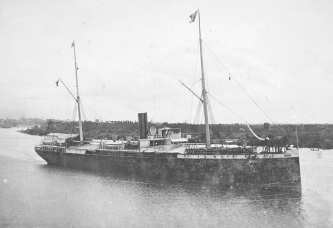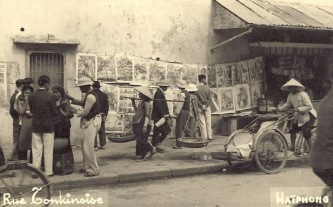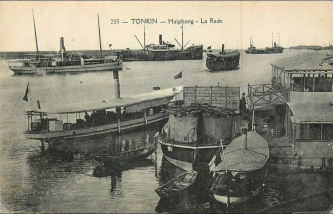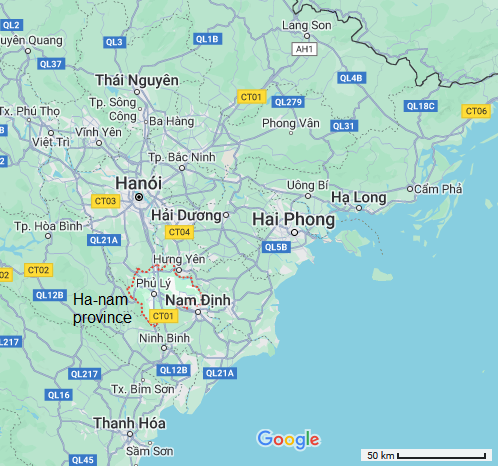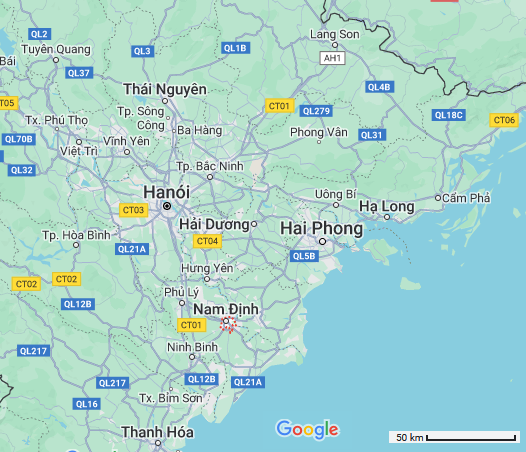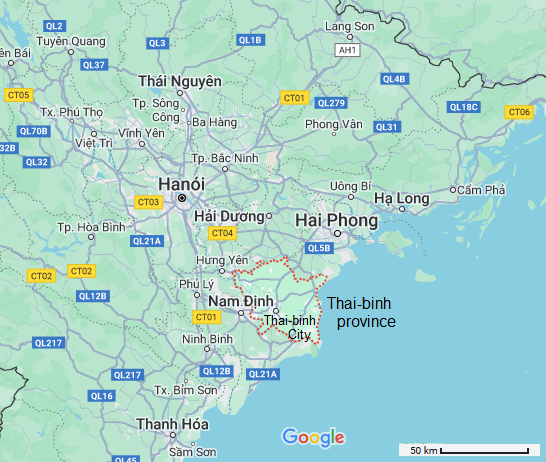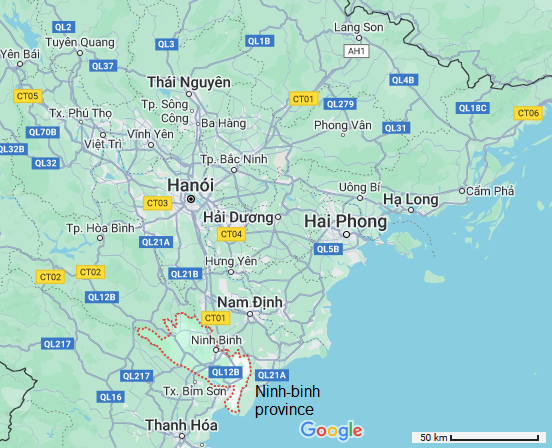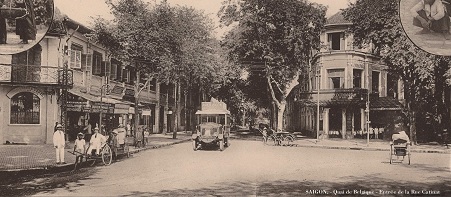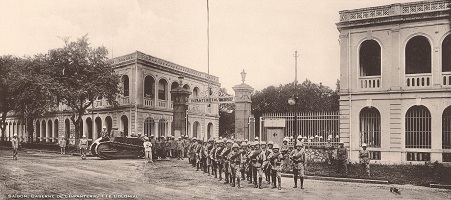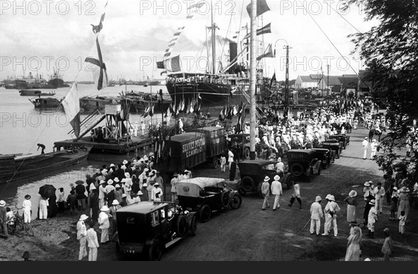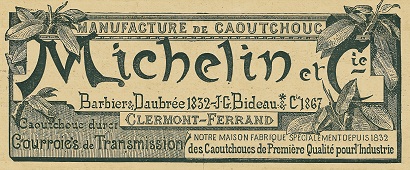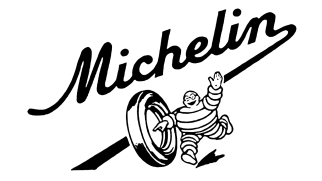2. The road into hell
2.1. North Vietnam June 1927: Tran Tu Binh with the analphabetic farmers
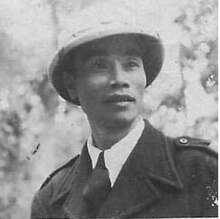
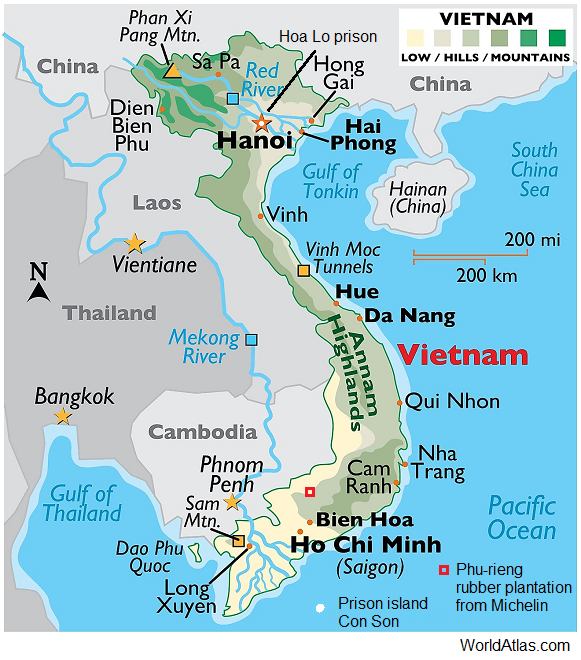
Tran Tu Binh 1949 [1] - map of Vietnam [map 01]
People often say that rubber workers have a spirit of
determination, even of life-or-death struggle, and will
never retreat. And they are not mistaken, because not only
were rubber workers exploited and repressed in the extreme
on the rubber MONOplantations, but they were even
exploited and repressed while they were on the road to
those hells on earth.
In June 1927, we newly recruited workers had been gathered
by the hundreds and crammed into the recruiting service's
bamboo and thatch camps at
Ha-ly (quarter
of Hai-phong [web01]) and
Hai-phong.
It was heartrending to see the recruited workers awaiting
the ships. We were all farm folk from the provinces of
Ha-nam,
Nam-dinh, Thai-binh, and Ninh-binh. We did not
have an inch of land, nor even one zinc coin. These were
people forced by intolerable circumstances to band
together and go to work the rubber MONOplantations; few
were actually taken in by the enticing words of the
recruiters.
[Farmers are only interesting for the government for
enslaving them - solidarity]
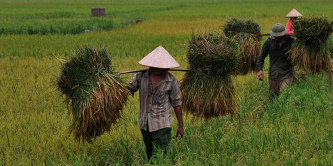
Vietnam rice farmers without machines [5]
Only after they left their home villages did they come to
know each other. For ages farming folk had seldom paid any
attention to events beyond the bamboo hedges of our own
villages. People usually had to work night and day just to
survive. The spring harvest was hardly over when it was
time to work on the fall crop. When the fertilizing was
done, it was time to cultivate the corn and yams. When did
we have any time to think of more distant matters:
And yet, as soon as we left our home villages, we were
living together and protecting each other. There was one
very intense thing that drew us into a tightly knit group.
At the time we did not recognize it. It was only much
later that we understood it: that people in a common
situation of poverty, of oppression, must unite, must join
together in order to have any hope of securing a morsel of
food or a scrap of clothing.
[Farmers separated in groups according to their origin
- Tran is an exception reading and writing]
We had to stay at Ha-ly [port quarter of Haiphong] to wait
for the ship. Hundreds of people divided up the living
space in rows of steel-roofed sheds, broad as an elephant
cage, but squat and unbearably hot. On all four sides was
a swamp of stinking sewage. The people from
Thai-binh
were in one section, then those from
Ha-nam,
from
Nin-hbinh -- each province to its own
section. I lived with the natives of Ha-nam. They were
found of me because I was very direct and because I took
care of the sick and the exhausted. Besides,
I knew
how to write, and I often helped them with
letters -- a few lines to send back to their loved ones
before they set out.
This was one reason that during the struggle of the people
from
Nam-dinh and
Thai-binh,
the recruit workers from Ha-nam listened to me and
supported them wholeheartedly, even though they were
hardly involved in the affair at all.
2.2. North Vietnam June 1927: The
analphabetic farmers are betrayed systematically by the
"contractors"
[Cr. contractors at the port: with bad food: "the rice
was rotten" - "the dried fish was completely rotten"]
That incident set the whole port in an uproar. When we
left home and came to Ha-ly, we had all signed contracts
with the contracting foremen. This bunch were the
right-hand men of the [p.15] recruiters. Two clauses of
the contracts were involved in the struggle at Ha-ly. One
said that the contracting foreman had to provide food and
water for the recruits: two xu per meal per person [note
01]. If they had spent the proper amount of money, it
would still have been necessary to supplement the rations.
But at the time the contractors were only providing 1.2
xu.
The rice was rotten, and when it was
scooped out of the pot it stank like roach dung and stuck
together in chunks.
The dried fish was completely
rotten, and no matter how much salt they added
in the kitchen, the stench was still unbearable. When this
situation was discovered, the recruits from those
provinces all raised a furious storm of protest.
[Cr. contractors at the port: with discrimination with
money 10 or 6 dong: "they had said ten dong" - but
farmers from Nam-dinh+Thai-binh only got "six dong"]
There was another clause which was not written down in the
contracts -- something the recruiters said to entice the
poor to sign on as laborers. They said that they would
give each worker ten dong to take care of various
miscellaneous expenses before leaving. The contractors
raked off part of that from the very first. In the case of
the brothers and sisters from Ha-nam, including me,
they
had said ten dong all along, so we all got the
full amount. But in the case of the brothers and sisters
from Nam-dinh, and Thai-binh, they gave each person only
six
dong.
[This is quite normal "Christian" robbery behavior against
other cultures - "Christians" are shi...].
[Cr. contractors at the port: with FAKE contract: "he
sold his life and his freedom to a capitalist
("Christian!") master" - criminal "Christians"want to
"skim a few dong"]
How could our country folk, who always were so trusting,
be aware of such mean maneuvers? Actually, they could not
even read the provisions of the contracts they had signed.
And there were some who were tricked into signing the
contracts like this: The recruiters said they had to take
the workers' pictures to give to the government. Then, if
anything happened later, the government would come to
their aid. So they took each laborer off to have his
picture made. They took profiles; they took full-face
shots -- all kinds. After that, they held out a piece of
paper and told the person to make his mark so he could get
the pictures later. Only afterwards did the workers learn
that the piece of paper was in fact a preprinted contract.
The person who had been thus deceived did not realize that
he was putting his mark to a piece of paper in which
he
sold his life and his freedom to a capitalist master.
When the workers did not even know what was in the written
contracts they had signed, naturally no one bothered to
tell them what the "verbal understandings" were. The
contractors, "working on a case-by-case basis", would
skim
a few dong from this person and a few dong
from the next.
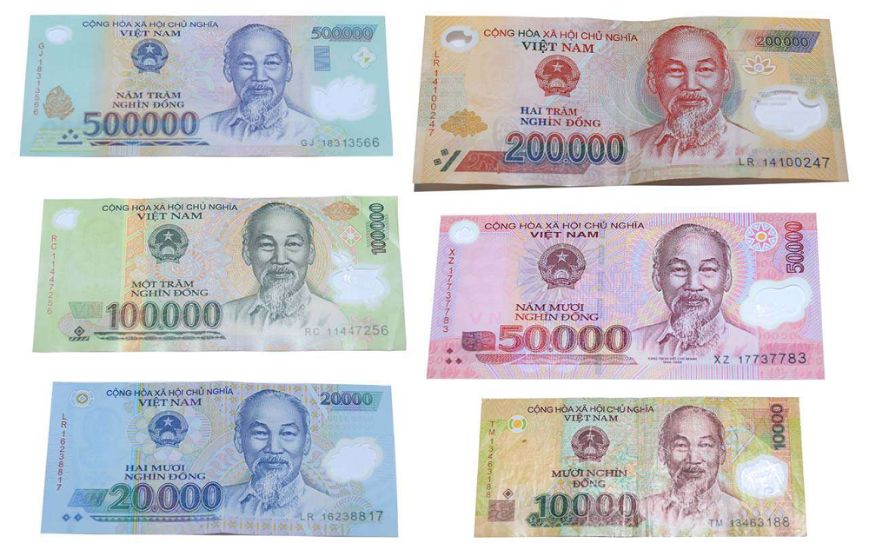
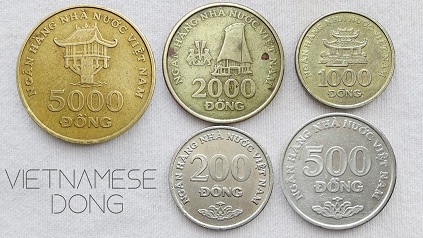
Vietnam money Dong [6] - Vietnam money Dong coins [7]
So the brothers and sisters from Nam-dinh and Thai-binh
who received six dong each were content to have received
that much. But when a man keeps stuffing gold into his
pocket, it will eventually show. When they got to Ha-ly
one person asked another, and the recruits from Nam-dinh
and Thai-binh were shocked when they found out that the
contractors had skimmed off four dong from them.
The brothers from Ha-nam came to discuss the matter of the
money rake-off with me. I answered, "We are all in the
same situation. If they ask us, we ought to go along
and lend them a hand." And then, with everyone enraged by
the miserable food [p.16], the struggle broke out. It was
a struggle, but the truth was there was no leadership
committee and there was no organized rank and file. It was
simply a spontaneous struggle by people who had reached
the end of their rope, who no longer knew what fear was.
My role was only that of spokesman.
Our adversary in the struggle at that time was
Phan
Tat Tao. This character was a contractor who,
along with the recruiters, had stepped forward to lure
people from northern Viet Nam and sell them to the French.
Tao very seldom came to the section of Ha-ly where the
sheds were. He normally just let his henchmen deal with
the recruits. And he was never present at our meals.
That noon, as at every meal, each person got only one bowl
of rice with a piece of dried fish the size of three
fingers. As usual it was heavily salted fish -- putrid and
stinking. The bucket of tea, too, had just enough for each
person to have one bowlful. And so it was that the
struggle broke out.
We refused to eat.
Hundreds of voices shouted out for Phan Tat Tao to come.
Tao's henchmen were scared out of their wits. When they
saw us shouting and going on a hunger strike, they cleared
out.
Our shouts rocked the whole Ha-ly area. at the time we did
not realize that the struggle had broken out at a
particularly opportune moment. The colonialists needed
many more sites as way stations for the recruit workers.
While they remained on northern soil, near their home
villages, it was quite easy for recruits to desert and
return home in waves. So
Phan Tat Tao had to come
and talk to us. At first he tried to smooth
things over with us, saying he would see to it that our
food was improved. But we protested noisily, demanding
that
Tao carry out his promises, that he
implement all provisions of the contract. The workers
said: "We have sold our homes, sold our lives for ten
dong, and if you don't pay it all, we aren't leaving."
[Protest against criminal
contractors: Phan Tat Tao correcting the money affair]
Phan Tat Tao saw we were tense, saw from our attitude and
words that we were quite determined. He knew things were
going badly and that he would have to give in to us. That
very noon meal he prepared extra rations. As for the money
that had been raked off from the brothers and sisters from
Thai-binh and Nam-dinh, he was so ashamed that that very
night he had his henchmen bring the money, call out names,
and
place the proper amount in each person's hand.
So our first struggle was victorious. This experience
showed me all the more clearly that, although peasants
usually kept things to themselves, whenever they were
thrown together they were very much in sympathy with each
other. The struggle had just ended.
[The criminal "Christians" and food for the working
class
1. It is a "Christian" tradition to rob the victims of
their money AND
2. It is a "Christian" tradition to give them spoiled food
while robbing the state money for good food. BECAUSE
3. The calculations from Paris have reserved enough money
for good food so that everyone has good food, BUT the
"Christian" bosses on the ship prefer to steal this money
and then they just produce spoiled food. AND
4. The tropical climate is not suitable for large-scale
production in advance, because everything rots within 3
days, but the "Christian" bosses do not want to prepare
fresh food if they do not have to eat it themselves, and
so all workers receive spoiled food.
5. This is how the "Christian" catastrophe takes place in
the colonies, in the tropical zones of the whole world -
the "Christians" are just shi...]
2.3. Haiphong June 1927: the ship
"Commandant Dorier" with "sleeping mats"
[The ship "Commandant Dorier" with "a cargo of people"
and "sleeping mat"]
While I was staying at Hai-phong, I was able to meet
brother Ton Van Tran again. Tran was very glad to hear the
news of our victory. he both praised me and admonished me:
"That's the way! Just be sure to keep it up now." His
admonition [warning] was engraved deeply in my heart.
Afterwards we always stayed on the offensive against the
enemy, thanks to that precious advice.
And then the ship which was to take us away docked in
[p.17] Hai-phog. The [steamer]
Commandant Dorier
was a cargo ship which often docked at Hai-phong to take
on Thai-nguyen iron ore to carry to France. This time,
besides a quantity of ore,
there was a cargo of
people -- us.
When we boarded the ship we recruit workers divided up the
spaces according to provinces of origin, Ha-nam in one
area, then Nam-dinh and Thai-binh, each province with its
own section. The ship's master tossed each person a
sleeping
mat to spread out right on the deck of the
ship. This was used as both sleeping and eating space.
[The ship with the "cargo of people": different reasons
for looking for work - Tran becomes a "speaker" of the
enslaved]
After our successful struggle, our spirits were high and
the bonds of mutual sympathy were very strong. A small
number who had been indifferent before, including even
village notables who had lost their money, lost their
jobs, and left home to find work, were now drawn along,
too. A number of Ha-nam youth of around my age admired my
spirit of daring to act and to take on hardship. They drew
along with them a number of youth from Nam-dinh and
Thai-binh as well. It would have been natural for that
camaraderie to have mellowed our anxiety as we set out for
a distant land to seek our livelihood. But the situation
forced us to launch a new struggle.
I agreed to step forward to talk with the ship's master.
At the time some of the brothers on the ship had passed
their certificate exams [note 02], and could speak French
fairly well. I gathered nine or ten of them together. I
thought we might need someone to take my place if the
situation got tense and the ship's master took me away.
That possibility forced me to seek out more supporters.
[The ship with the "cargo of people": hunger strike and
threats - toilet - "they had to eat what they were
given" - French sailors applauding to the hunger
strikers - good food and Tran becomes Pham Van Phu and
the "young oncle" (!)]
At noon we went on a
hunger strike and
asked for the ship's master. In a moment the
lieutenant-commander who was captain of the ship came into
the hold. I stepped forward and spoke to him in French on
behalf of the brothers and sisters.
"According to our contracts, we are supposed to have
enough to eat, meat with our rice, and hot tea to drink.
But the galley doesn't give us enough to eat, and there's
not enough to drink, either. We ask that you carry out the
contract."
The ship's master flushed with anger. "If I let you eat
your fill and you get seasick and vomit it up all over the
deck, what then?" he retorted [responded].
[The "Christians" always invent a reason to steal money].
I did not accept that, and responded: "What you say is not
right. We have a right to eat our fill. When we've eaten
our fill there may be some who will vomit and others who
won't. But you must let us eat our fill."
The ship's master would not debate the matter further and
[p.18] abandoned reason entirely. He exploded in a rage,
treacherously seized me and
threatened to throw me
into the sea. I was not frightened by his
threats and held fast to the opinion I had expressed.
After that, he
shut me up in the toilet and
told everyone
they had to eat what they were given.
[And he was filling his pockets]. He was not prepared for
our spirit of solidarity and determination. As much as he
threatened the brothers and sisters, they were still
determined to live or die together and refused to eat. The
French sailors admired us. They tossed the recruits
packets of bread and cheese. They winked and waved and
signaled to encourage us to keep it up.
By that evening the ship's master had to compromise and
give us decent food. That meal we even had beef. And the
master released me. THe recruit workers were elated
[cheered] and gave me a cordial welcome.
So the group of convertes to my cause had grown much
larger than the original handful of youth. At that time,
just eighteen, I was rather nice looking, upstanding, and
unpretentious by nature, and easily won the affections of
all. My name at that time was
Pham Van Phu.
The recruits held me in esteem and called me "
young
oncle". They had absolute confidence in
"uncle"
Phu, and came to ask me about everything.
[The ship with the "cargo of people": Tran speaking in
French with the French sailors - good trip to Saigon]
The French sailors also liked me. The very ay of my
victorious struggle, they sought me out; took me back to
their quarters; and brought out wine, bread, and beef for
a party. We laughed and joked together. And after that we
sang French and Vietnamese folk songs for each other.
After that struggle, I became the ad hoc representative
for our group of recruits. When anything came up, they
sought me out to ask me or tell me about it. The same
thing went for the master and his gang. Whenever he wanted
to communicate anything to the recruits, the ship's master
would come looking for me. But these relatively
comfortable circumstances only lasted for a short time,
during the final days on the Dorier. When we reached
Khanh-hoi (in Sai-gon), the cruel and repressive nature of
the rubber plantation owners became very apparent
[criminal "Christian" Michelin company].
2.4. Saigon June 1927: criminal
"Christian" Michelin agents like animals+cattle
[Saigon June 1927: criminal "Christian" Michelin agents
treating farmers like animals+cattle+"cursing" with
mobbing - the "assembly area"]
As soon as the [steamer] Dorier docked in Sai-gon, the
overseers, both ["Christian"] French and [bribed]
Vietnamese, sprang noisily aboard. They used canes on the
heads of the recruits, counting us like
animals.
Our baggage -- simple bags and baskets -- was scattered
ant torn, and some people's wives and children got tangled
up [confused] in their loads. The whole throng -- hundreds
of people -- was driven ashore by the overseers like a
herd of
cattle.
On the shore the [criminal "Christian" French] police
swarmed like flies. They divided up and stood on both
sides of the street, on every ten meters, bull-dicks (
rawhide
blackjacks) and billy clubs ready i their
hands. Meanest of all were the half-breeds. They
constantly
cursed: "You mother fuckers!
Savages!" As they cursed, they flailed about with their
clubs, aiming at our heads and necks. And the others were
no laggards. They constantly urged us on with: "
Move
it on, move it on", at the same time lashing
out with their clubs. The brothers and sisters were
seething with [p.19] rage, but because there had been no
advance preparations to deal with this situation, we had
to restrain ourselves and go on to the assembly area.
[Saigon June 1927: electing speaker Truong Lap - a
"cobra" - criminal "Christian" French police + overseers
beating everybody - "Secret Police inspector" - the
"little ones" - Tran: "take them to court"]
When we reached the place, as soon as they had set down
their crumpled parcels, they came to see me. We discussed
the situation among ourselves and selected a
representative to intercede with the overseers. I was not
the one to step forward this time. The task of
representing us was given to a man named
Truong Lap.
Brother Lap was originally from Cat-lai in Bnih-luc
District. He was tall and strong, and his face was always
red as a beet. He was bold by nature and refused to
retreat no matter what the difficulty. Whatever danger he
encountered, he was unwavering and had a spirit as hot as
a
cobra.
We shouted out, demanding to meet with the chief recruiter
to protest the beatings. THe overseers and police closed
in. "What's all this shouting about?" one of them asked
us.
"Masters, you have cursed and beat us from the side of the
shop [from the landing zone in the port of Saigon] all the
way up here", Lap exploded provocatively. "Now what if I
curse you once and see what you think about it?"
The
overseers and [criminal "Christian" French] police
moved in at once and beat us unmercifully.
They bashed brother Truong Lap on the head with a billy
club and laid him out on the ground, blood streaming out
all over his body. I cried out to the brothers. They began
to shout and went on a rampage. This frightened the
overseers and police, and they ran out to call the
[criminal "Christian" French]
Secret Police
inspector. A short while later, they swarmed
in like bees. The man in the lead was a Frenchman who
spoke Vietnamese quite well. "What's going on?" he asked.
"What do you
little ones think you are
doing?"
Angry because they were treating us like animals, and
madder still because this [criminal "Christian"] Frenchman
was addressing us like children, I boiled over and steppe
forward to answer: "We 'gentlemen' signed a contract to
come down here to work. The contract promised there would
be no beatings. Yet they have beaten us 'men'. That is not
lawful. If they continue to beat us, we 'men' will
take
them to court!"
On all sides the brothers shouted out curses. Seeing the
situation was tense, the inspector backed down. "Come on,
'kids', keep it orderly and there won't be any problem."
He was afraid the sound of the shouting would be heard
beyond the compound, and he wanted to finish transferreing
the workers to the rubber company [Michelin] so he would
no longer be responsible. He agreed to transfer the two
half-breed overseers who had beaten us most harshly. And
he allowed Lap to be taken to the hospital for treatment.
Brother Lap died later at [the "Christian" Michelin rubber
MONOplantation of]
Phu-rieng in 1928. If he
had not died, he would surely have turned into a fine
fighter.
2.5. Saigon June 1927: the new quarters
"arrival department"="concentration camp"
[Saigon with "Christian" "concentration camp" for
farmer candidates for rubber farm: barbed wire, guards,
barracks without windows]
After this skirmish [fight], we finally took a look at our
new quarters, which the overseers called the
arrival department. In fact, this
arrival
department was a branch of the inspectorate
for southern Viet Nam. It was exactly like a
concentration
camp, with
barbed wire fences
on all four sides and gendarmes and police inspectors
standing
guard day and night. Inside were
rows [p.20] of steel-roofed
barracks. Each
barracks had two rows of iron-wood pilings, one on either
side. Inside the barracks it was pitch-dark since there
was
not so much as a single window -- only
the big door where people went in and out.
[Maybe "Communist" Russian Gulag with 5 pointed star,
hammer and sickle was even better?].
[Saigon with "Christian" "concentration camp" for
farmer candidates for rubber MONOculture farms: the
FANTASY contract for 3 years]
The inspectors carried out constant searches. Those who
had not yet signed contracts were forced to complete
everything. The contract had several conditions which were
quite seductive, but which were never carried out. It also
had many provisions which were very severe. According to
the
[FANTASY] contract,
-- rubber workers would have their wages computed daily,
-- [rubber workers] would have living quarters provided,
-- [rubber workers] would have a clinic providing free
medical treatment, and
-- [rubber workers] could purchase food at low plantation
rates.
At the end of the
three-year contract,
-- they would be able to return to their home villages,
and
-- the plantation owner would bear all expenses of the
return journey.
[[WHAT A FANTASY! Probably the Michelin company paid for
these services, but the "Christian" plantation bosses and
foremen of Michelin stole the money and did not even give
the rubber workers the minimum. In the "Christian"
colonies, robbery was systematically developed and one can
assume that there was even a competition to see who could
steal the most. Stealing in the colonies was for the
"Christians" like a "sport"].
2.6. "Christian" Michelin Phu-rieng CC:
toxic "medicine" - fight for clear water - cruel
punishments - torturing pregnant women
["Christian" Michelin "plantation clinic" Phu-rieng:
toxic medicine provoking more illness than before]
In any event, none of the above provisions were carried
out, or if they were, they were not carried out fully. For
example, speaking of free medical care I will simply
mention that whenever someone was sick and went up to the
plantation clinic to ask for medicine, the plantation
nurses would give him a very "efficient" kind of treatment
-- telling him to fast for a few days to halt the
"progress" of the disease. So the sick person would not
dare go for an examination after that, no matter how
severe his illness [would be in the future].
["Christian" Michelin "plantation" Phu-rieng: fight for
cooked clear water]
Or there were many conditions we had to force them to
implement, like the clause on hot tea for us to drink
during working hours.
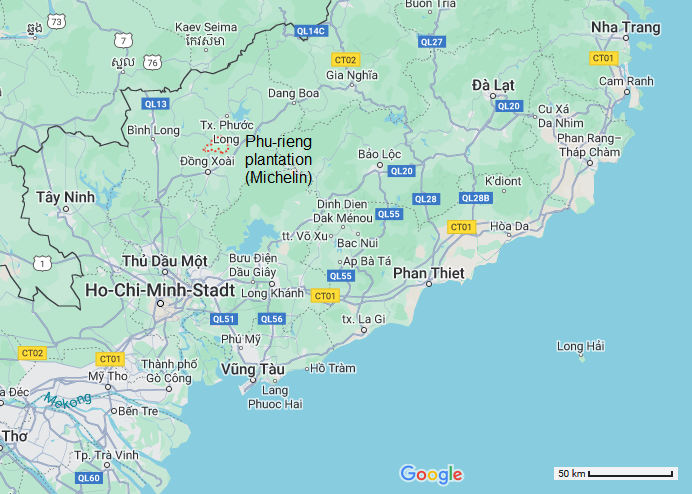
Map of South Vietnam with Ho Chi Minh City (HCMC - ex
Saigon) and Phu-rieng rubber MONOplantation in the hills
[map 06]
And there were a great many of the harsh clauses. One of
them provided that anyone who did not follow orders from a
superior, who was disruptive, caused an incident, or was
absent without permission would be fined. On the second
offense he would be imprisoned for
5 to 10 days in
solitary confinement [isolation captivity] if
the offense was termed "
disturbing the peace".
["Christian" Michelin "plantation" Phu-rieng: torturing
pregnant women with complete work]
Another provision said: Women shall not be given work
beyond their strenght; a woman shall be entitled to one
month's maternity leave before she bears her child, and
for two months after she gives birth she shall only be
assigned
light work. But in reality the
women had to endure a more
shameful
situation than the men. I will recount those episodes
later. [New born babies were stolen or killed].
2.7. Saigon June 1927
"arrival department"="concentration camp": 1 week lost
- the transport
[Solidarity prepared for a 3 years stay in Phu-rieng
rubber plantation - bust most of them will die - red and
gray soil]
At the Khan-hoi arrival service it was about a week before
all the paperwork was finished. During the time we were
waiting, we grew closer and closer to each other. When we
talked, it was entirely about practical matters. For
instance, we said:
-- "We have no close relatives. So we must learn to
protect each other."
-- Or: "They bristle with guns and clubs. We will have to
unite our forces if we want to survive."
-- Or: "Let's try to take care of each other, wait until
the end of the three-year contract, then go back to our
families, our villages, and our home region."
But, in fact,
very few would be able to go home
[because they died on the MONOplantation or were murdered
by the "Christian" French police or wards].
One day trucks from the rubber companies ["Christian"
Michelin company from France] pulled up at the arrival
center. At that time, there were many large companies in
the rubber sector in southern Vietnam, such as the
Compagnie
des [p.21] Terres Rouges. The reason it had
this name was that in the south there were two kinds of
soil suitable for growing rubber, one
red
and the other
gray.
2.8. The "Christian" rubber companies and
plantations in South Vietnam - stealing land!
[The "Christian" rubber companies in South Vietnam:
Terres Rouges (Red Earth) - Mimot - Michelin (little
Mike) - Tropic Tree - stealing 50,000 ha of land]
Besides the compagnie des
Terres Rouges,
there were
Mimot,
Michelin,
and the "
Tropic Tree" company. Each
established a number of different MONOplantations in rows
[the giant "Christian" crime installing MONOcultures].
They divided the land among themselves to plunder it.
Companies applied to open up as much as
50,000
hectares at a time. So they were very short of
labor. Every time new recruit workers arrived, they had to
be divided among the various companies to see to it that
each company received a fair share.
[The "Christian" rubber MONOplantations in South
Vietnam: Sa-cam, Sa-cat, Loc-ninh, Dau-tieng, Bo-dot,
and Phu-rieng]
So it was this time, too. They divided us up to go to
rubber MONOplantations at
Sa-cam, Sa-cat, Loc-ninh,
Dau-tieng, Bo-dot, and Phu-rieng. They divided
us up according to our native provinces. So a hundred and
fifty from Ha-nam, including me, were taken to Phu-rieng.
The Phu-rieng group was taken off last of all.
[Parted workers to 6 different "Christian" rubber
plantations CCs - the FAKE hope for going home after 3
years of work - Tran will be kidnapped to prison island
Con-son]
I do not have to tell you how upset we were at being
divided up into six or seven groups like that. We had come
to feel very close after those days of hunger,
ill-treatment, whippings, and victorious struggle so far
from home. We had felt certain we would live or died
together for the next three years. So you can ask yourself
how heartsick we felt at having to part overnight like
that.
In my own case, the brothers and sisters from Thai-binh
and Nom-dinh and I felt very attached to each other. They
bid me a reluctant farewell, took their things, and
boarded the truck. "If only you could go with me, Uncle,
It would be so good", someone said to me. I was very moved
and very sad when I saw their affection and their
confidence in me. I could think of nothing to say except
to admonish them: "Go on, now. I hope You'll stick
together and return home after three years. Maybe we'll be
able to go back on the same ship."
At that time we did not imagine that the number of people
who would escape death would be so small. Nor could we
imagine the kind of life we would lead at the rubber
plantations. It is fortunate that someone lived through it
all to recount the horrible scenes of those hells on
earth.
All the other groups left the arrival department one after
another. The hundred and fifty of us from Ha-nam set out
in the last load, bound for Phu-rieng. I stayed there
three years, but at the end of my term instead of being
able to return home, I was taken out on a ship to Con-son
[Vietnamese Franch "Christian" prison island] by the
[criminal "Christian" French] imperialists.
But that story comes three years later [p.22]
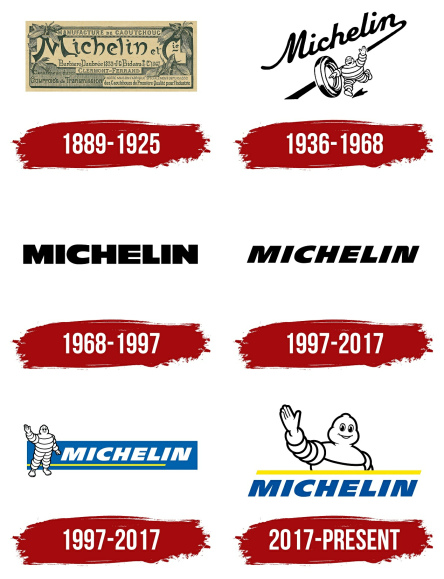
Michelin Logos 1889-2024 - a criminal "Christian" rubber
company like any other in Europe against Africa,
"America", and Asia for the production of tires for
vehicles, rubber seals and rubber boots etc. [13]
[Who were the other rubber companies that terrorized the
world with concentration camps in the "Christian" criminal
colonies? Goodyear, Dunlop, Bridgestone, Continental,
Apollo, etc.].



